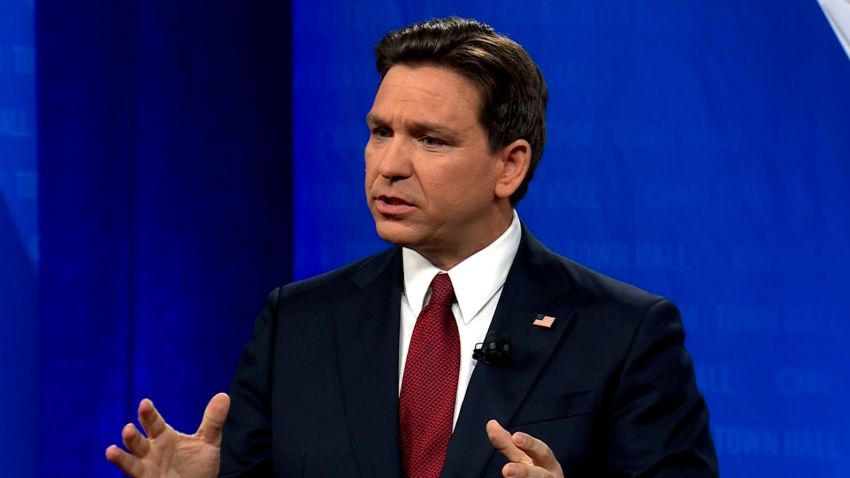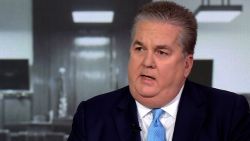Florida Gov. Ron DeSantis and former South Carolina Gov. Nikki Haley each participated in CNN town halls on Thursday in Iowa ahead of the state’s caucuses later this month.
The candidates, who are vying to emerge as the main alternative to former President Donald Trump, took questions from likely GOP caucus-goers and from moderators Kaitlan Collins and Erin Burnett at Grand View University in Des Moines.
DeSantis and Haley both made several claims worth checking.
DeSantis touts Florida’s economy
DeSantis once again touted Florida’s economic strength, saying “our economy’s ranked No. 1 in our own 50 states by CNBC” and “income growth is top of the charts.”
Facts First: DeSantis’ first claim is accurate: CNBC declared Florida the nation’s top economy in a July article. It’s worth noting, of course, that various media rankings use differing subjective methodologies. But his second claim about income growth is inaccurate, at least by one recent measure.
There are multiple ways to measure income growth, and DeSantis did not specify the measure, nor the time period. But according to the Bureau of Economic Analysis, personal income in Florida grew by 3.5% between the second and third quarters of 2023, earning it a rank of 21 among states. Texas ranked No. 1 with a growth rate of 5.2%.
— From CNN’s Tami Luhby and Daniel Dale
DeSantis and the pandemic
DeSantis criticized former President Donald Trump and Anthony Fauci, who served as director of the National Institute of Allergy and Infectious Diseases from 1984 to 2022, for their handling of the Covid-19 pandemic, claiming they had locked down the nation and then said: “Florida led the way in dragging this country out of lockdown.”
Facts First: DeSantis’ claim is misleading at best. Before he became a vocal opponent of pandemic restrictions, DeSantis imposed significant restrictions on individuals, businesses and other entities in Florida in March 2020 and April 2020; some of them extended months later into 2020. He did then open up the state, with a gradual phased approach, but he did not keep it open from the start.
DeSantis received criticism in March 2020 for what some critics perceived as a lax approach to the pandemic, which intensified as Florida beaches were packed during Spring Break. But that month and the month following, DeSantis issued a series of major restrictions. For example, DeSantis:
• Closed Florida’s schools, first with a short-term closure in March 2020 and then, in April 2020, with a shutdown through the end of the school year. (In June 2020, he announced a plan for schools to reopen for the next school year that began in August. By October 2020, he was publicly denouncing school closures, calling them a major mistake and saying all the information hadn’t been available that March.)
• On March 14, 2020, announced a ban on most visits to nursing homes. (He lifted the ban in September 2020.)
• On March 17, 2020, ordered bars and nightclubs to close for 30 days and restaurants to operate at half-capacity. (He later approved a phased reopening plan that took effect in May 2020, then issued an order in September 2020 allowing these establishments to operate at full capacity.)
• On March 17, 2020, ordered gatherings on public beaches to be limited to a maximum of 10 people staying at least six feet apart, then, three days later, ordered a shutdown of public beaches in two populous counties, Broward and Palm Beach. (He permitted those counties’ beaches to reopen by the last half of May.)
• On March 20, 2020, prohibited “any medically unnecessary, non-urgent or non-emergency” medical procedures. (The prohibition was lifted in early May 2020.)
• On March 23, 2020, ordered that anyone flying to Florida from an area with “substantial community spread” of the virus, “to include the New York Tri-State Area (Connecticut, New Jersey and New York),” isolate or quarantine for 14 days or the duration of their stay in Florida, whichever was shorter, or face possible jail time or a fine. Later that week, he added Louisiana to the list. (He lifted the Louisiana restriction in June 2020 and the rest in August 2020.)
• On April 3, 2020, imposed a statewide stay-home order that temporarily required people in Florida to “limit their movements and personal interactions outside of their home to only those necessary to obtain or provide essential services or conduct essential activities.” (Beginning in May 2020, the state switched to a phased reopening plan that, for months, included major restrictions on the operations of businesses and other entities; DeSantis described it at the time as a “very slow and methodical approach” to reopening.)
-From CNN’s Daniel Dale
DeSantis on family farms and federal estate taxes
DeSantis said that family farms are vital to the nation’s security, and it’s better for the US when they can be passed down from generation to generation.
“We need to eliminate the death tax on these family farms so that they can pass it down without getting taxed,” he said.
Facts First: DeSantis’ comments need context. Very few farmers’ estates are subject to federal estate taxes, according to the US Department of Agriculture.
Only 0.22% of farmers’ estates – about 87 estates – would owe federal estate taxes in 2022, according to an estimate from the agency’s Economic Research Service. Only estates valued at more than $12.06 million in 2022 were required to file a federal estate tax return, but not all of them would owe estate taxes in that year.
– From CNN’s Tami Luhby
Haley’s claims about Biden administration and Texas razor wire
Asked about the surge of migrants entering the United States, Haley said that the Biden administration is trying to “go against” the governor of Texas by cutting down razor wire along the US-Mexico border.
Facts First: This needs context. While it’s true that the Biden administration wants to allow the US Border Patrol to remove razor wire at the US-Mexico border, the administration has said in court documents that agents cut the wire to provide medical assistance to migrants who need it, or to apprehend migrants who have already crossed into US territory.
Texas Attorney General Ken Paxton sued the Biden administration last year, claiming that Border Patrol agents were cutting or moving concertina wire along a particular stretch of the Rio Grande in violation of state law.
A federal appeals court last month ordered agents to stop the practice while court proceedings play out, and the Justice Department asked the Supreme Court earlier this week to overturn that decision.
As part of their arguments to the justices, the DOJ wrote that the appeals court ruling has “serious on-the-ground consequences” for agents and “removes a key form of officer discretion to prevent the development of deadly situations,” including “mitigating the serious risks of drowning and death from hypothermia or heat exposure.”
The department has also argued that federal immigration law supersedes Texas’ own efforts to confront migrants attempting to cross the border into the US.
The merits of Texas’ case against the administration have not yet been decided in court, and it appears Texas itself may have done what it’s accusing the Biden administration of doing.
CNN previously reported that in July 2023, one Texas official claimed officers may need to “open” the wire in case of emergency, and in August 2023, an immigration attorney told CNN that Texas state troopers cut the razor wire to arrest their clients for crossing the border.
–From CNN’s Hannah Rabinowitz
Haley on the national debt
Former South Carolina Gov. Nikki Haley voiced concerns about the nation’s mounting debt and interest payments.
“As of now, in a couple years, we’ll be paying more money in interest payments than we are in our defense budget,” she said.
Facts First: Haley‘s projection is right. If rates remain high, as expected, interest payments could overtake defense spending within a few years, according to the Committee for a Responsible Federal Budget, a government watchdog group.
The increase in the nation’s debt and the Federal Reserve’s repeated rate hikes have prompted a meteoric rise in interest payments. Net interest costs soared to $659 billion in fiscal year 2023, which ended September 30, according to the Treasury Department. That’s up 39% from the previous year and is nearly double what it was in fiscal year 2020.
Interest payments now rank as the fourth largest government program in spending, behind Social Security, Medicare and defense, according to CRFB. Defense spending totaled $821 billion in fiscal year 2023, according to the Treasury Department.
The government spent more on net interest than on Medicaid, veterans programs and all spending on children in the last fiscal year, according to CRFB.
-From CNN’s Tami Luhby




















